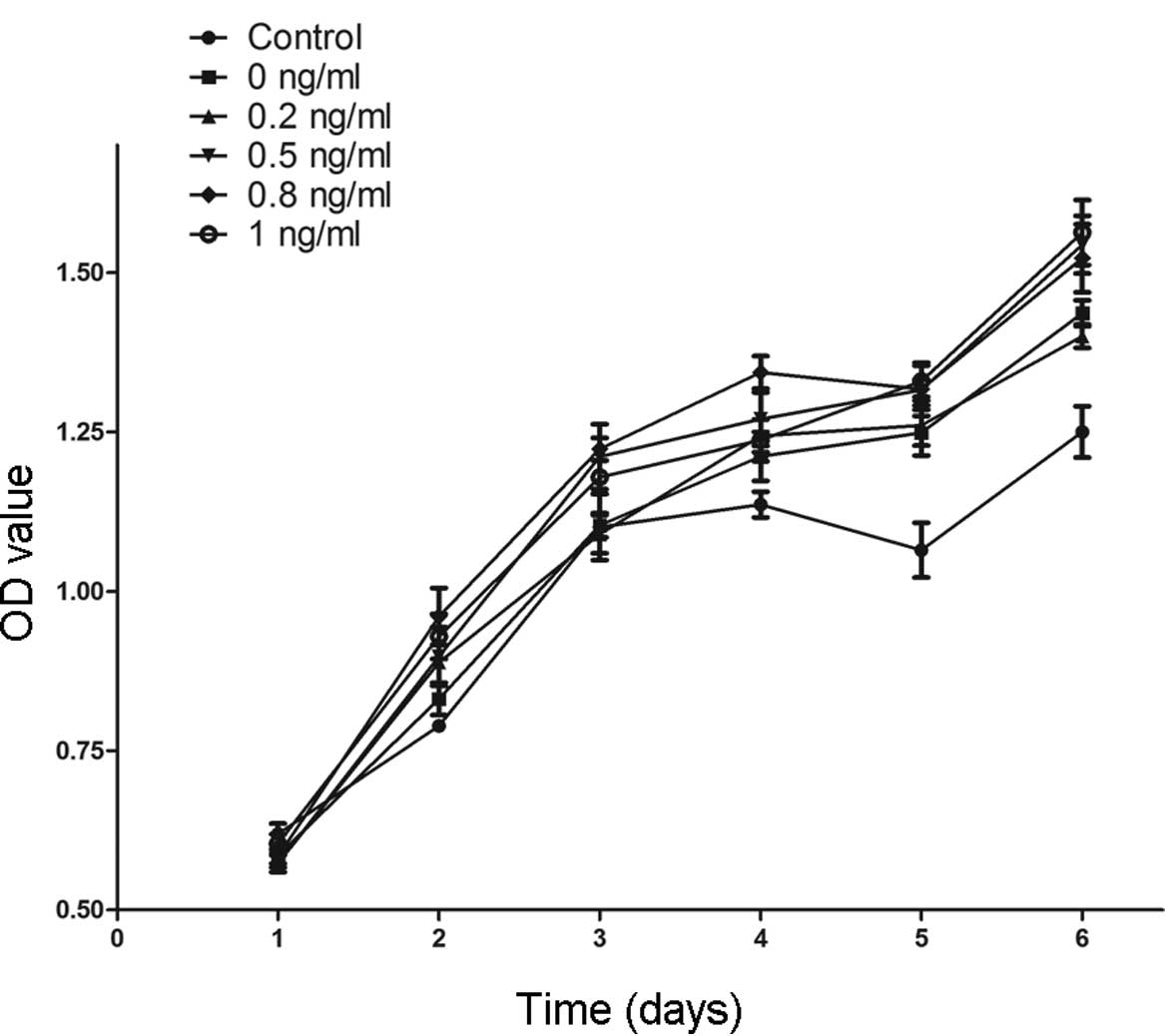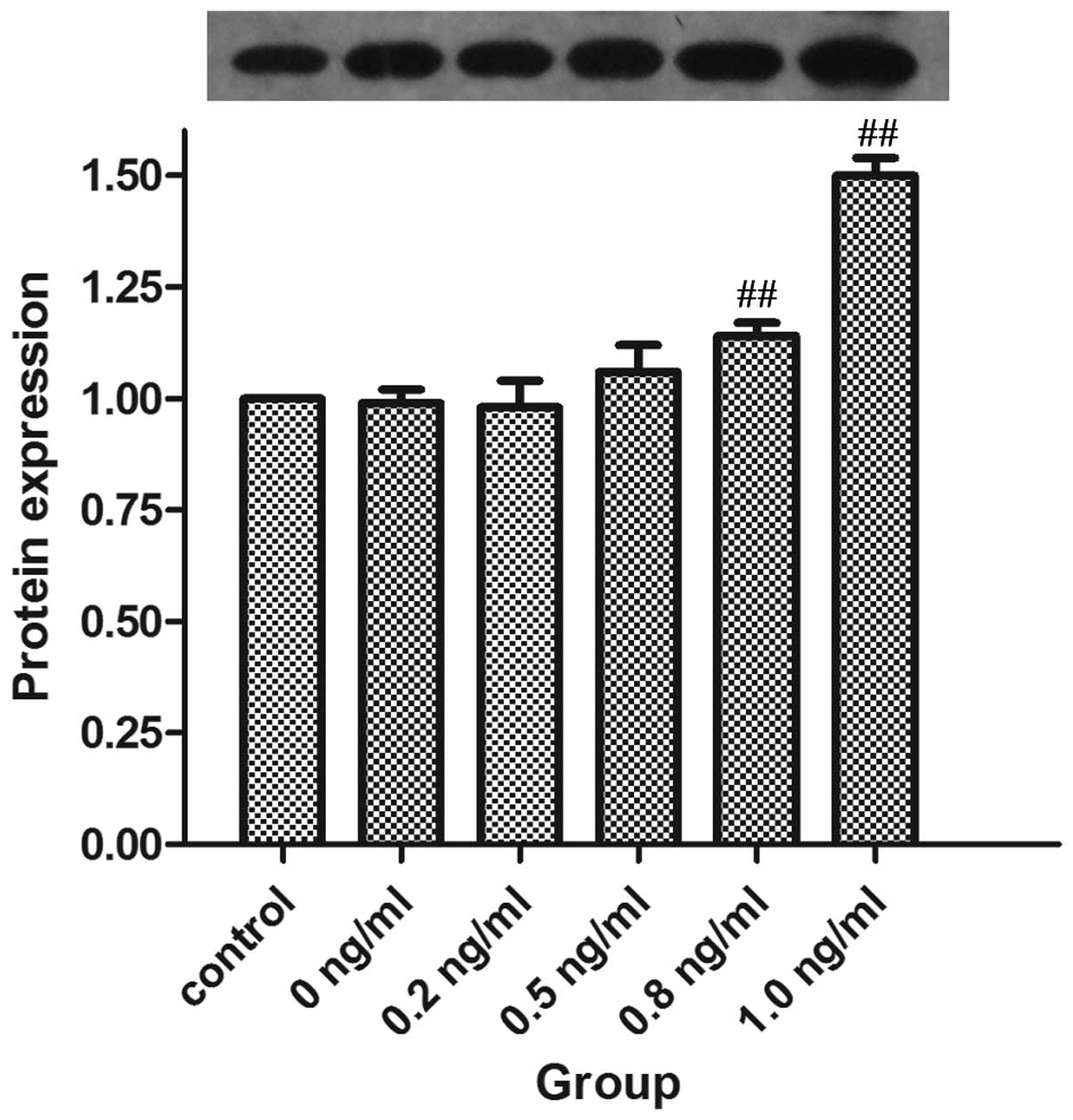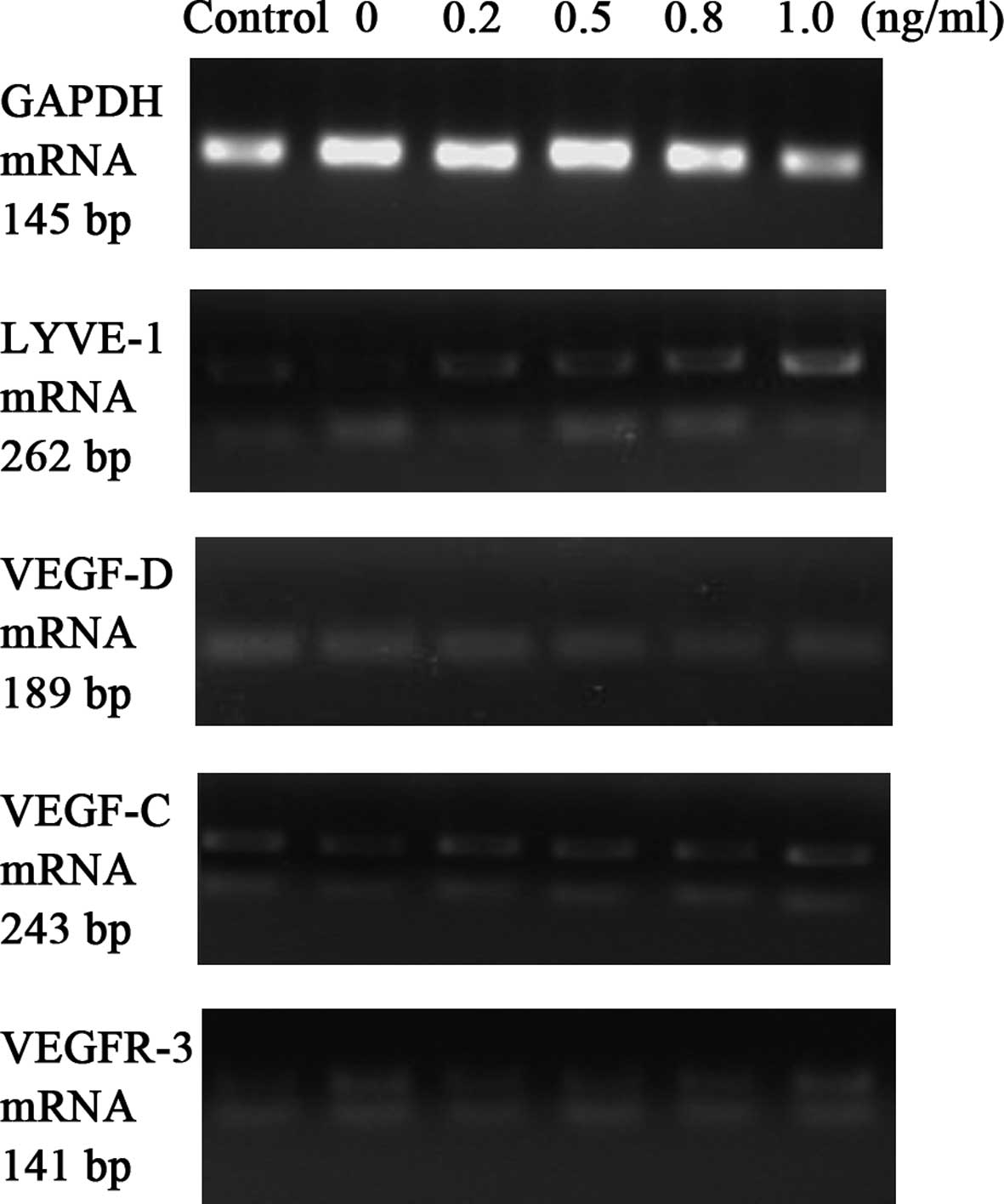|
1
|
Ren Z, Pang G, Clancy R, Li LC, Lee CS,
Batey R, Borody T and Dunkley M: Shift of the gastric T-cell
response in gastric carcinoma. J Gastroenterol Hepatol. 16:142–148.
2001. View Article : Google Scholar : PubMed/NCBI
|
|
2
|
Kitadai Y, Haruma K, Mukaida N, Ohmoto Y,
Matsutani N, Yasui W, Yamamoto S, Sumii K, Kajiyama G, Fidler IJ,
et al: Regulation of disease-progression genes in human gastric
carcinoma cells by interleukin 8. Clin Cancer Res. 6:2735–2740.
2000.PubMed/NCBI
|
|
3
|
Kuai WX, Wang Q, Yang XZ, Zhao Y, Yu R and
Tang XJ: Interleukin-8 associates with adhesion, migration,
invasion and chemosensitivity of human gastric cancer cells. World
J Gastroenterol. 18:979–985. 2012. View Article : Google Scholar : PubMed/NCBI
|
|
4
|
Waugh DJ and Wilson C: The interleukin-8
pathway in cancer. Clin Cancer Res. 14:6735–6741. 2008. View Article : Google Scholar : PubMed/NCBI
|
|
5
|
Zhao ZS, Wang YY, Chu YQ, Ye ZY and Tao
HQ: SPARC is associated with gastric cancer progression and poor
survival of patients. Clin Cancer Res. 16:260–268. 2010. View Article : Google Scholar
|
|
6
|
Petrova TV, Mäkinen T, Mäkelä TP, Saarela
J, Virtanen I, Ferrell RE, Finegold DN, Kerjaschki D, Ylä-Herttuala
S and Alitalo K: Lymphatic endothelial reprogramming of vascular
endothelial cells by the Prox-1 homeobox transcription factor. EMBO
J. 21:4593–4599. 2002. View Article : Google Scholar : PubMed/NCBI
|
|
7
|
Hirakawa S, Hong YK, Harvey N, Schacht V,
Matsuda K, Libermann T and Detmar M: Identification of vascular
lineage-specific genes by transcriptional profiling of isolated
blood vascular and lymphatic endothelial cells. Am J Pathol.
162:575–586. 2003. View Article : Google Scholar : PubMed/NCBI
|
|
8
|
Hong YK, Harvey N, Noh YH, Schacht V,
Hirakawa S, Detmar M and Oliver G: Prox1 is a master control gene
in the program specifying lymphatic endothelial cell fate. Dev Dyn.
225:351–357. 2002. View Article : Google Scholar : PubMed/NCBI
|
|
9
|
Koch AE, Polverini PJ, Kunkel SL, Harlow
LA, DiPietro LA, Elner VM, Elner SG and Strieter RM: Interleukin-8
as a macrophage-derived mediator of angiogenesis. Science.
258:1798–1801. 1992. View Article : Google Scholar : PubMed/NCBI
|
|
10
|
Strieter RM, Kunkel SL, Elner VM, Martonyi
CL, Koch AE, Polverini PJ and Elner SG: Interleukin-8. A corneal
factor that induces neovascularization. Am J Pathol. 141:1279–1284.
1992.PubMed/NCBI
|
|
11
|
Kim H, Kataru RP and Koh GY: Regulation
and implications of inflammatory lymphangiogenesis. Trends Immunol.
33:350–356. 2012. View Article : Google Scholar : PubMed/NCBI
|
|
12
|
Bernaudin JF, Kambouchner M and Lacave R:
Lymphatic vascular system, development and lymph formation. Review
Rev Pneumol Clin. 69:93–101. 2013.In French. View Article : Google Scholar
|
|
13
|
Yu H, Zhang S, Zhang R and Zhang L: The
role of VEGF-C/D and Flt-4 in the lymphatic metastasis of
early-stage invasive cervical carcinoma. J Exp Clin Cancer Res.
28:982009. View Article : Google Scholar : PubMed/NCBI
|
|
14
|
Harada A, Sekido N, Akahoshi T, Wada T,
Mukaida N and Matsushima K: Essential involvement of interleukin-8
(IL-8) in acute inflammation. J Leukoc Biol. 56:559–564.
1994.PubMed/NCBI
|
|
15
|
Raman D, Baugher PJ, Thu YM and Richmond
A: Role of chemokines in tumor growth. Cancer Lett. 256:137–165.
2007. View Article : Google Scholar : PubMed/NCBI
|
|
16
|
Xie K: Interleukin-8 and human cancer
biology. Cytokine Growth Factor Rev. 12:375–391. 2001. View Article : Google Scholar : PubMed/NCBI
|
|
17
|
Uemura N, Okamoto S, Yamamoto S, Matsumura
N, Yamaguchi S, Yamakido M, Taniyama K, Sasaki N and Schlemper RJ:
Helicobacter pylori infection and the development of gastric
cancer. N Engl J Med. 345:784–789. 2001. View Article : Google Scholar : PubMed/NCBI
|
|
18
|
Correa P and Houghton J: Carcinogenesis of
Helicobacter pylori. Gastroenterology. 133:659–672. 2007.
View Article : Google Scholar : PubMed/NCBI
|
|
19
|
Crabtree JE, Farmery SM, Lindley IJ,
Figura N, Peichl P and Tompkins DS: CagA/cytotoxic strains of
Helicobacter pylori and interleukin-8 in gastric epithelial cell
lines. J Clin Pathol. 47:945–950. 1994. View Article : Google Scholar : PubMed/NCBI
|
|
20
|
Sharma SA, Tummuru MK, Miller GG and
Blaser MJ: Interleukin-8 response of gastric epithelial cell lines
to Helicobacter pylori stimulation in vitro. Infect Immun.
63:1681–1687. 1995.PubMed/NCBI
|
|
21
|
Campbell LM, Maxwell PJ and Waugh DJ:
Rationale and means to target pro-inflammatory interleukin-8
(CXCL8) signaling in cancer. Pharmaceuticals. 6:929–959. 2013.
View Article : Google Scholar : PubMed/NCBI
|
|
22
|
Ju D, Sun D, Xiu L, Meng X, Zhang C and
Wei P: Interleukin-8 is associated with adhesion, migration and
invasion in human gastric cancer SCG-7901 cells. Med Oncol.
29:91–99. 2012. View Article : Google Scholar
|
|
23
|
Scavelli C, Weber E, Aglianò M, Cirulli T,
Nico B, Vacca A and Ribatti D: Lymphatics at the crossroads of
angiogenesis and lymphangiogenesis. J Anat. 204:433–449. 2004.
View Article : Google Scholar : PubMed/NCBI
|
|
24
|
Achen MG and Stacker SA: Tumor
lymphangiogenesis and metastatic spread - new players begin to
emerge. Int J Cancer. 119:1755–1760. 2006. View Article : Google Scholar : PubMed/NCBI
|
|
25
|
Pepper MS, Tille JC, Nisato R and Skobe M:
Lymphangiogenesis and tumor metastasis. Cell Tissue Res.
314:167–177. 2003. View Article : Google Scholar : PubMed/NCBI
|
|
26
|
Nakamura Y, Yasuoka H, Tsujimoto M,
Kurozumi K, Nakahara M, Nakao K and Kakudo K: Importance of lymph
vessels in gastric cancer: A prognostic indicator in general and a
predictor for lymph node metastasis in early stage cancer. J Clin
Pathol. 59:77–82. 2006. View Article : Google Scholar : PubMed/NCBI
|
|
27
|
Alitalo K, Tammela T and Petrova TV:
Lymphangiogenesis in development and human disease. Nature.
438:946–953. 2005. View Article : Google Scholar : PubMed/NCBI
|
|
28
|
Achen MG, McColl BK and Stacker SA: Focus
on lymphangio-genesis in tumor metastasis. Cancer Cell. 7:121–127.
2005. View Article : Google Scholar : PubMed/NCBI
|
|
29
|
Shimizu K, Kubo H, Yamaguchi K, Kawashima
K, Ueda Y, Matsuo K, Awane M, Shimahara Y, Takabayashi A, Yamaoka
Y, et al: Suppression of VEGFR-3 signaling inhibits lymph node
metastasis in gastric cancer. Cancer Sci. 95:328–333. 2004.
View Article : Google Scholar : PubMed/NCBI
|
|
30
|
Al-Rawi MA and Jiang WG: Lymphangiogenesis
and cancer metastasis. Front Biosci. 16:723–739. 2011. View Article : Google Scholar
|
|
31
|
Medina-Franco H, Cabrera-Mendoza F,
Almaguer-Rosales S, Guillén F, Suárez-Bobadilla YL and
Sánchez-Ramón A: Lymph node ratio as a predictor of survival in
gastric carcinoma. Am Surg. 79:284–289. 2013.PubMed/NCBI
|
|
32
|
Tawada M, Hayashi S, Osada S, Nakashima S
and Yoshida K: Human gastric cancer organizes neighboring lymphatic
vessels via recruitment of bone marrow-derived lymphatic
endothelial progenitor cells. J Gastroenterol. 47:1057–1060. 2012.
View Article : Google Scholar : PubMed/NCBI
|
|
33
|
Choi I, Lee YS, Chung HK, Choi D,
Ecoiffier T, Lee HN, Kim KE, Lee S, Park EK, Maeng YS, et al:
Interleukin-8 reduces post-surgical lymphedema formation by
promoting lymphatic vessel regeneration. Angiogenesis. 16:29–44.
2013. View Article : Google Scholar
|
|
34
|
Mu H, Calderone TL, Davies MA, Prieto VG,
Wang H, Mills GB, Bar-Eli M and Gershenwald JE: Lysophosphatidic
acid induces lymphangiogenesis and IL-8 production in vitro in
human lymphatic endothelial cells. Am J Pathol. 180:2170–2181.
2012. View Article : Google Scholar : PubMed/NCBI
|
|
35
|
Sakai Y, Goodison S, Kusmartsev S,
Fletcher B, Eruslanov E, Cao W, Porvasnik S, Namiki K, Anai S and
Rosser CJ: Bcl-2 mediated modulation of vascularization in prostate
cancer xeno-grafts. Prostate. 69:459–470. 2009. View Article : Google Scholar
|
|
36
|
Al-Rawi MA, Mansel RE and Jiang WG:
Molecular and cellular mechanisms of lymphangiogenesis. Eur J Surg
Oncol. 31:117–121. 2005. View Article : Google Scholar : PubMed/NCBI
|
|
37
|
Platonova N, Miquel G, Regenfuss B, Taouji
S, Cursiefen C, Chevet E and Bikfalvi A: Evidence for the
interaction of fibroblast growth factor-2 with the lymphatic
endothelial cell marker LYVE-1. Blood. 121:1229–1237. 2013.
View Article : Google Scholar
|
|
38
|
Leung DW, Cachianes G, Kuang WJ, Goeddel
DV and Ferrara N: Vascular endothelial growth factor is a secreted
angiogenic mitogen. Science. 246:1306–1309. 1989. View Article : Google Scholar : PubMed/NCBI
|
|
39
|
Schoppmann SF, Birner P, Stöckl J, Kalt R,
Ullrich R, Caucig C, Kriehuber E, Nagy K, Alitalo K and Kerjaschki
D: Tumor-associated macrophages express lymphatic endothelial
growth factors and are related to peritumoral lymphangiogenesis. Am
J Pathol. 161:947–956. 2002. View Article : Google Scholar : PubMed/NCBI
|
|
40
|
Ming J, Zhang Q, Qiu X and Wang E:
Interleukin 7/interleukin 7 receptor induce c-Fos/c-Jun-dependent
vascular endothelial growth factor-D up-regulation: A mechanism of
lymphangiogenesis in lung cancer. Eur J Cancer. 45:866–873. 2009.
View Article : Google Scholar : PubMed/NCBI
|
|
41
|
Matsumoto M, Roufail S, Inder R, Caesar C,
Karnezis T, Shayan R, Farnsworth RH, Sato T, Achen MG, Mann GB, et
al: Signaling for lymphangiogenesis via VEGFR-3 is required for the
early events of metastasis. Clin Exp Metastasis. 30:819–832. 2013.
View Article : Google Scholar : PubMed/NCBI
|
|
42
|
Ji RC: Lymph node lymphangiogenesis: A new
concept for modulating tumor metastasis and inflammatory process.
Histol Histopathol. 24:377–384. 2009.PubMed/NCBI
|
|
43
|
Matsumura S, Oue N, Mitani Y, Kitadai Y
and Yasui W: DNA demethylation of vascular endothelial growth
factor-C is associated with gene expression and its possible
involvement of lymphangio-genesis in gastric cancer. Int J Cancer.
120:1689–1695. 2007. View Article : Google Scholar : PubMed/NCBI
|
|
44
|
Kodama M, Kitadai Y, Tanaka M, Kuwai T,
Tanaka S, Oue N, Yasui W and Chayama K: Vascular endothelial growth
factor C stimulates progression of human gastric cancer via both
autocrine and paracrine mechanisms. Clin Cancer Res. 14:7205–7214.
2008. View Article : Google Scholar : PubMed/NCBI
|
|
45
|
Yuanming L, Feng G, Lei T and Ying W:
Quantitative analysis of lymphangiogenic markers in human
gastroenteric tumor. Arch Med Res. 38:106–112. 2007. View Article : Google Scholar
|
|
46
|
Zhu P, Zhang J, Chen Q, Wang J and Wang Y:
Expression of vascular endothelial growth factor-C in gastric
carcinoma and the effect of its antisense gene transfection on the
proliferation of human gastric cancer cell line SGC-7901. Am J
Surg. 204:78–83. 2012. View Article : Google Scholar : PubMed/NCBI
|
|
47
|
Yashiro M, Shinto O, Nakamura K, Tendo M,
Matsuoka T, Matsuzaki T, Kaizaki R, Ohira M, Miwa A and Hirakawa K:
Effects of VEGFR-3 phosphorylation inhibitor on lymph node
metastasis in an orthotopic diffuse-type gastric carcinoma model.
Br J Cancer. 101:1100–1106. 2009. View Article : Google Scholar : PubMed/NCBI
|
|
48
|
Yonemura Y, Endo Y, Tabata K, Kawamura T,
Yun HY, Bandou E, Sasaki T and Miura M: Role of VEGF-C and VEGF-D
in lymphangiogenesis in gastric cancer. Int J Clin Oncol.
10:318–327. 2005. View Article : Google Scholar : PubMed/NCBI
|
|
49
|
Kitadai Y, Kodama M, Cho S, Kuroda T,
Ochiumi T, Kimura S, Tanaka S, Matsumura S, Yasui W and Chayama K:
Quantitative analysis of lymphangiogenic markers for predicting
metastasis of human gastric carcinoma to lymph nodes. Int J Cancer.
115:388–392. 2005. View Article : Google Scholar : PubMed/NCBI
|
|
50
|
Krzystek-Korpacka M, Matusiewicz M,
Diakowska D, Grabowski K, Blachut K, Konieczny D,
Kustrzeba-Wojcicka I, Terlecki G and Banas T: Elevation of
circulating interleukin-8 is related to lymph node and distant
metastases in esophageal squamous cell carcinomas - implication for
clinical evaluation of cancer patient. Cytokine. 41:232–239. 2008.
View Article : Google Scholar : PubMed/NCBI
|
|
51
|
Sharma SA, Tummuru MK, Blaser MJ and Kerr
LD: Activation of IL-8 gene expression by Helicobacter pylori is
regulated by transcription factor nuclear factor-kappa B in gastric
epithelial cells. J Immunol. 160:2401–2407. 1998.PubMed/NCBI
|
|
52
|
Watari K, Nakao S, Fotovati A, Basaki Y,
Hosoi F, Bereczky B, Higuchi R, Miyamoto T, Kuwano M and Ono M:
Role of macrophages in inflammatory lymphangiogenesis: Enhanced
production of vascular endothelial growth factor C and D through
NF-kappaB activation. Biochem Biophys Res Commun. 377:826–831.
2008. View Article : Google Scholar : PubMed/NCBI
|



















